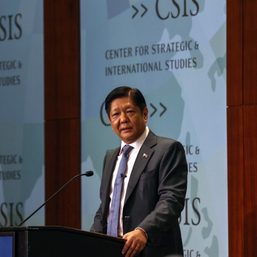SUMMARY
This is AI generated summarization, which may have errors. For context, always refer to the full article.
![[OPINION | Newspoint] More crimes against humanity](https://www.rappler.com/tachyon/2020/12/vergelgfx.jpg)
It’s a desperately craved gift, and one that couldn’t have arrived at a more opportune season: The office of the prosecutor of the International Criminal Court (ICC) finds “reasonable basis” to believe that “crimes against humanity” have been committed in President Duterte’s war on drugs.
The first of those two quoted phrases is the operative one: Reasonable basis establishes the precondition for starting the prosecutorial investigation that will collect evidence in such amount and of such quality as required for the case to go to trial.
It has been more than 3 years since the case was filed, but, perhaps, precisely because the wait took so long, when it finally ended, a mixed sense of hopeful elation and delayed gratification began to assuage the long despairing, fearful, and indignant hearts of many Filipinos. (READ: PH case comes at ‘decisive moment’ for Int’l Criminal Court)
Indeed, under a regime disposed to authoritarianism, with countervailing institutions, including the courts, intimidated or coopted by it, the rule of law is short-circuited; as a result, a situation so dire is created that outside judicial intervention becomes a last recourse, and for that the second quoted phrase provides the justification: Crimes against humanity are crimes perpetrated in a fashion so widespread and systematic the entire civilized world ought to be so outraged by them as to feel morally obliged to dispense collective justice – for all humanity, as it were.
The first case that went to trial under those universal terms, in 1945-1946, was too monstrous for any comparison, let alone, admittedly, for an association with the crimes Duterte himself is accused of. It involved the mass murders of six million Jews, crimes enabled by a confluence of factors, two chiefly: the expedient cover of a world war and a war-making demagogue who held an entire racist nation in thrall, but who would himself commit suicide to escape humanity’s judgment.
Yet unborn as Hitler rampaged through pre-contemporary history, Duterte keeps his memory alive by emulation. He paid homage to him to set the tone for his own presidency. He’d “be happy,” he said, to half-match Hitler’s record by exterminating the – by his own conveniently exaggerated count – 3 million drug dealers and users in his country.
Mercifully abysmally poorer in math and method than Hitler, Duterte did not realize that, even at the frenzied kill rate in his drug war, it would take 150 years to do as he promised. His calculations failing him consistently, he found himself altering the term of his promise from six months to one year to until the end of his six-year presidential tenure, before stopping himself making further promises and simply carrying on with the killing.
Draconian business
At any rate, with 20,000 drug-war dead in the first year alone, he was taken to the ICC, and, while the court evaluated the case, his regime went on with its draconian business, even branching out.
He went after his critics, of whom two women in particular have been put through unrelenting repression: At the turn of the decade Leila de Lima, the senator and human-rights champion, will mark her fourth year in detention on drug charges shown, by the absence of concrete evidence and the poisoned testimonies of life-term convicts, to have been concocted; and Maria Ressa, the outstanding international journalist who founded Rappler and is its chief executive officer, has been convicted of libel by the unjustified retroactive application of a new law; she faces a second similar case, not to mention other implausible cases.
Then, the pandemic struck. Taking advantage of the panicked dread not only of the virus itself but of the consequent loss of livelihood and the hunger, Duterte railroaded an Anti-Terrorism Law through Congress and accelerated the militarization of the bureaucracy. The complementary measures have helped him distract the nation from his regime’s ineptness, corruption, and overall inhumanity in the face of great national suffering. At the same time, they have strengthened his authoritarian impulse.
He has resuscitated that old bogey – the communists. They are lucky to be simply labeled; they are bound to suffer worse as the regime becomes more desperate to make an impression. And, with it becoming more and more desperate for that, the situation is not unlikely to constitute another case comprising crimes against humanity – even before the current one goes to trial. – Rappler.com
Add a comment
How does this make you feel?






![[Rappler Investigates] Deal or no deal, Duterte?](https://www.rappler.com/tachyon/2024/05/deal-or-no-deal-duterte-may-16-2024.jpg?resize=257%2C257&crop=422px%2C0px%2C1080px%2C1080px)
![[ANALYSIS] How have scholars confronted the war on drugs in the Philippines?](https://www.rappler.com/tachyon/2024/05/tl-scholars-war-on-drugs.jpg?resize=257%2C257&crop_strategy=attention)


There are no comments yet. Add your comment to start the conversation.